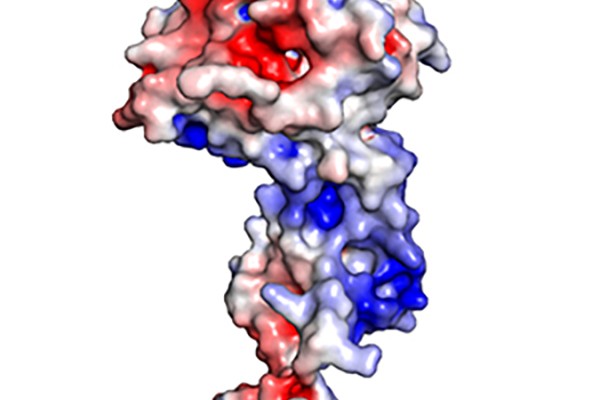New Ebola study points to potential drug target
Opening the door for potential treatments for the deadly Ebola virus, scientists at Washington University and elsewhere have found that a way to kill the virus by interfering with its replication.
Synthetic RNAs designed to fight cancer
In search of better cancer treatments, Xiaowei Wang, PhD, and his colleagues at the School of Medicine have designed synthetic molecules that combine the advantages of two experimental RNA therapies.
Key genetic error found in family of blood cancers
Scientists have uncovered a critical genetic mutation in some patients with myelodysplastic syndromes — a group of blood cancers that can progress to a fatal form of leukemia. The research team at Washington University School of Medicine in St. Louis also found evidence that patients with the mutation are more likely to develop acute leukemia.
Sophisticated DNA technology now accessible to area scientists
Washington University’s Department of Genetics has established the Genome Technology Access Center to offer high-speed genome sequencing and other advanced genetic technologies to scientists both within and beyond the university.
Scientists identify antivirus system
Viruses have led scientists at Washington University School of Medicine in St. Louis to the discovery of a security system in host cells. Viruses that cause disease in animals beat the security system millennia ago. But now that researchers are aware of it, they can explore the possibility of bringing the system back into play in the fight against diseases such as sudden acute respiratory syndrome (SARS), West Nile virus, dengue and yellow fever.
Plant polymerases IV and V are special forms of Polymerase II
It’s a little like finding out that Superman is actually Clark Kent. A team of biologists at Washington University in St. Louis has discovered that two vital cellular components, nuclear RNA Polymerases IV and V (Pol IV and V), found only in plants, are actually specialized forms of RNA Polymerase II, an essential enzyme of all eukaryotic organisms, including humans.
Researchers solve piece of large-scale gene silencing mystery
PikaardA team led by Craig Pikaard, Ph.D., WUSTL professor of biology in Arts & Sciences, has made a breakthrough in understanding the phenomenon of nucleolar dominance, the silencing of an entire parental set of ribosomal RNA genes in a hybrid plant or animal. Since the machinery involved in nucleolar dominance is some of the same machinery that can go haywire in diseases such as cancer, Pikaard and his collaborators’ research may have important implications for applied medical research. Click here for a podcast from Genetic Engineering & Biotechnology News: Interview with Craig Pikaard.
New gene silencing pathway found in plants
Biologists at Washington University in St. Louis have made major headway in explaining a mechanism by which plant cells silence potentially harmful genes. A team led by Craig Pikaard, Ph.D., WUSTL professor of biology in Arts & Sciences, has published a paper this month in Cell, that explains how RNA polymerases work together to use the non-coding region of DNA to prevent destructive, virus-derived genes from being activated.
New type of RNA polymerase discovered in plants
*Arabidopsis thaliana*A team headed by Craig Pikaard, Ph.D., Washington University professor of biology in Arts & Sciences, has discovered a fourth kind of RNA polymerase found only in plants and speculated to have been a plant feature for more than 200 million years.
Nobel Prize recipient Sydney Brenner to discuss ‘Humanity’s Genes’
Nobel Prize-winning biologist Sydney Brenner will deliver the annual Arthur Holly Compton Memorial Lecture for the Assembly Series at 4 p.m. Tues, Oct. 14. The lecture,”Humanity’s Genes,” is free and open to the public and will be held in Graham Chapel, located just north of Mallinckrodt Center (6445 Forsyth Blvd.) on the Washington University campus. Brenner’s lecture will discuss some of the questions raised by the completion of the Human Genome Project. He will talk about both the benefits and the fears raised by recent breakthroughs in genetic research, and his belief that the brain is mightier than the genome.

